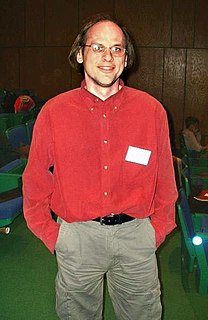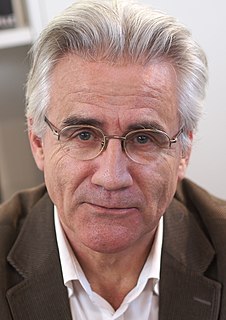A Quote by Gottfried Leibniz
The monad, of which we shall speak here, is nothing but a simple substance which enters into compounds; simple, that is to say, without parts.
Related Quotes
Nothing can be plainer, than that the motions, changes, decays, and dissolutions, which we hourly see befall natural bodies (and which is what we mean by the course of nature), cannot possibly affect an active, simple, uncompounded substance: such a being therefore is indissoluble by the force of nature, that is to say, the soul of man is naturally immortal.
Beauty means a lot of different things to a lot of different people. A lot of different ways in which things can be beautiful. But this really has a very specific meaning and which is more along the lines of elegance which is that we say an idea is beautiful or elegant in mathematics or physics if a very simple principle or a very simple idea, or simple set of ideas, turns out to be very powerful and leads to all sort of unexpected structure and unexpected predictions.
The fact would seem to be, if in my situation one may speak of facts, not only that I shall have to speak of things of which I cannot speak, but also, which is even more interesting, but also that I, which is if possible even more interesting, that I shall have to, I forget, no matter. And at the same time I am obliged to speak. I shall never be silent. Never.
A good author, and one who writes carefully, often discovers that the expression of which he has been in search without being able to discover it, and which he has at last found, is that which was the most simple, the most natural, and which seems as if it ought to have presented itself at once, without effort, to the mind.
The simple person lives the way he breathes, with no more effort or glory, with no more affectation and without shame Simplicity is freedom, buoyancy, transparency. As simple as the air, as free as the air The simple person does not take himself too seriously or too tragicallyHe has nothing to prove, since he has no appearances to keep up, and nothing to seek, since everything is before him. What is more simple than simplicity? What is lighter? It is the virtue of wise men and the wisdom of saints.
The positivists have a simple solution: the world must be divided into that which we can say clearly and the rest, which we had better pass over in silence. But can anyone conceive of a more pointless philosophy, seeing that what we can say clearly amounts to next to nothing? If we omitted all that is unclear, we would probably be left completely uninteresting and trivial tautologies.
God is utterly simple; for every composite being necessarily has a cause of its own composition, and so, since God is the first principle of all things, there can be no real composition whatever in God. Now, in an utterly simple being there can be nothing that is not that simple being itself. In God, therefore, whatever really is, is the same as God, is the same as that which is, is the same as that which subsists, and hence necessarily subsists.
He comes to us as One unknown, without a name, as of old, by the lakeside, He came to those men who knew Him not. He speaks to us the same words: "Follow thou me!" and sets us to the tasks which He has to fulfill for our time. He commands. And to those who obey Him, whether they be wise or simple, He will reveal himself in the toils, the conflicts, the sufferings which they shall pass through in His fellowship, and, as an ineffable mystery, they shall learn in their own experience Who He is.




































